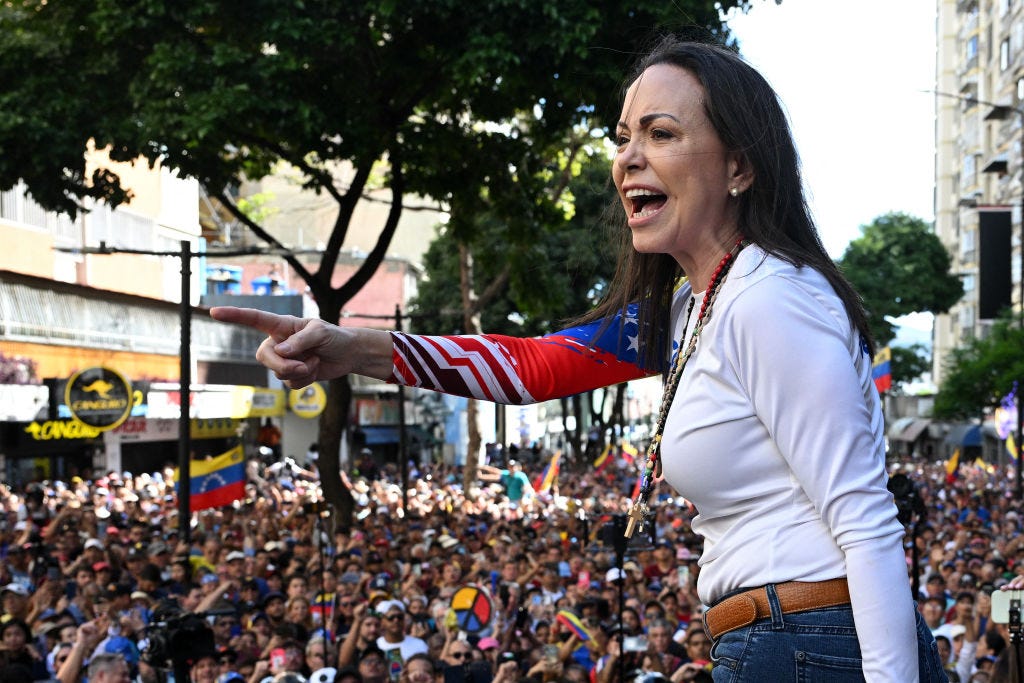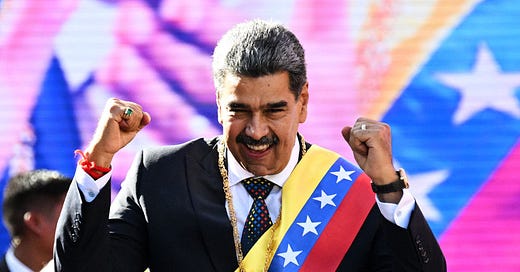
The Free Press

On Friday, Nicolás Maduro was sworn in as president of Venezuela for a third term, declaring victory in a stolen election. Though Venezuelans protested the fraud—thronging Caracas and other cities—the regime crushed the uprising and threw 2,000 opponents in jail. Venezuelans seem doomed to live under a regime that has brought them nothing but inflation, repression, and despair.
At The Free Press, we could think of no better person to reflect on Venezuela’s deepening political night than Roberto Ampuero, an acclaimed novelist and one of South America’s leading public intellectuals. As Chile’s foreign minister from 2018 to 2019, he helped spearhead regional efforts to democratize Venezuela. —The Editors
On January 10, a rare glimmer of hope penetrated the dense air of Caracas, igniting fleeting excitement among those who still dream of democracy for Venezuela. It happened when María Corina Machado, the indomitable leader of the Venezuelan opposition, was abruptly freed by the same police force that had detained her at a protest earlier in the day. The reversal seemed to carry the weight of a potential turning point—a signal of change in the nation’s trajectory.
Yet by the time night fell, that hope had dissolved.
The protests against Maduro had fallen far short of the fervor seen in years past or in July. Edmundo González Urrutia, the rightful victor of the election, and Machado’s ally, failed to return to the country as he had boldly promised. He remains in exile in Spain. Upon her release, Machado, who has lived mostly in hiding since the election of July 28, posted on X that she was “in a safe place now and with more determination than ever,” but the prospects for her movement were murky at best.
In truth, the day unfolded as it was always destined to: Maduro, the architect of Venezuela’s deepening despair, remained in power. To expect anything different would have bordered on naivete—a belief in miracles, in the notion that González Urrutia could stride into the ceremony and be recognized as the legitimate president by the nation’s military and security forces. No such miracle occurred. Instead, the opposition’s defiant actions became a solemn gesture, a reminder to the country and the world that the fight for democracy endures, but just barely.
Two starkly opposing narratives collided in Caracas Friday. On one side, the brutal realism of the Maduro regime—a machine of oppression that has drained the lifeblood of what was once one of Latin America’s most prosperous and freest nations, forced eight million to flee, and destabilized its neighbors. On the other, the fragile but tenacious hope embodied by Machado and González Urrutia. The opposition clings to the belief that there is still a road back to democracy—a path paved with constitutional principles, pluralism, and national reconciliation.

The script for January 10 had been written long before the day dawned. Its pages were penned in Havana and perfected in the corridors of Caracas, where the military, militias, and shock troops stand as unyielding guardians of Maduro’s rule. Overseeing this tightly controlled spectacle are Cuba’s seasoned intelligence and security forces—a shadowy hand guiding Venezuela’s fate. After all, the regime Fidel Castro founded has survived 66 years without once opening the gates to genuine democratic elections.
But Maduro’s survival demonstrates his utter reliance on the Cuban lifeline.
Once a Caracas bus driver, Maduro was chosen by Venezuela’s previous pro-Cuban military leader Hugo Chávez, who saw in him not just loyalty but also a figure trusted by Cuban intelligence—a force deeply embedded at the highest levels of Venezuelan governance.
Chávez himself, the self-styled father of twenty-first-century socialism, was enthralled by Fidel Castro. He looked to Havana as a model for his revolutionary vision, to be funded in Venezuela by oil wealth. Yet, the strings of this revolution were always pulled, in part, from Cuba. Intelligence advisers from the Communist island have helped the Venezuelan regime build a formidable spy network that keeps not only the civilian opposition at bay but, more importantly, stops unrest in the military before it can start.
It is through this lens—the Cuban “school”—that one must see Maduro’s resilience. From his ironclad control over the military to his deft maneuvering on the global stage, aligning with Russia, China, and Iran, his survival reflects the Havana regime’s application of the lessons it has learned from decades-long defiance of the West.
Cuba’s strategic embrace of Chávez was not merely ideological but existential. After the collapse of the Soviet Union, Fidel Castro recognized that Venezuela’s oil would be the key to Cuba’s survival. The Cuban intelligence apparatus, shaped by Soviet and East German expertise, became one of the most effective in the world—a “Kantian secret police,” as one Havana observer quipped, referencing the meticulousness of Markus Wolf, the East German spymaster who trained Cuban agents in the 1960s.
The principles of this “school” are deceptively simple but brutally effective. The first: Power, once taken, is never surrendered. Western leaders and academic analysts often misread regimes like those in Cuba and Venezuela, mistaking their ruthlessness for mere political missteps. This misjudgment has led to repeated failures, from Obama’s ill-fated engagement with Havana to the Biden administration’s recent overtures, which have yielded little beyond increased repression. Yet not even the Trump administration’s pressure campaign, supported widely in Europe and Latin America, gave results.
The Cuban doctrine also thrives on exploiting the vulnerabilities of Western democracies—divided interests, colonial guilt, and a preference for negotiation over confrontation. Caracas and Havana have manipulated those weaknesses with precision, outmaneuvering the United States, democratic counterparts in Latin America, and the Venezuelan opposition, time and again.
What remains unclear is how the world will respond as Venezuela’s crisis deepens. With projections of millions more displaced, and with U.S. oil companies lobbying for renewed access to the country, the new Trump administration will be tempted to seek a pragmatic détente with the regime. European countries and Canada, once part of a united front against the regime but now distracted by internal political conflicts, might seek individual deals with Maduro, too. Heavy responsibility lies with Latin America, where so far the elected left-wing presidents in Mexico, Colombia, and Brazil have accommodated Maduro’s election theft, betraying their own claimed democratic vocations.
What little hope remains lies not with foreign powers but with Venezuelans themselves. After her brush with the security forces on Friday, María Cortina Machado showed that she, at least, is prepared to be no less relentless than Venezuela’s tyrants. That of course is not sufficient to defeat them. But it is essential.
Novelist and journalist Roberto Ampuero has served as the minister of foreign affairs of Chile as well as that country’s ambassador to Mexico and Spain. He is the author of The Neruda Case and other historical fiction as well as the Cayetano Brulé detective series.




